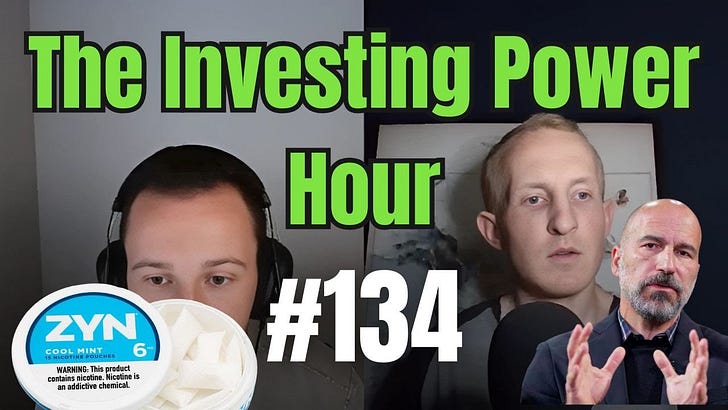When Not Selling Becomes The Hardest Part (Philip Morris International, PM)
Plus, links to this week's podcast talking Uber, McDonald's, Lyft, and our favorite small-cap of the week
YouTube
Spotify
Apple Podcasts
(Listen to discussions on multiple earnings reports from this week’s Investing Power Hour podcast! Links above)
Philip Morris International has probably been my biggest winner this year (not that 2024 was a hard year to find winners). The stock has posted a 40% total return in the last six months per Finchat.io:
A lot has gone right for Philip Morris. Foreign currency. Revamped IQOS. Buying Zyn at the absolute right moment. Combustibles market share gains, volume growth, and solid pricing power. Boom, boom, boom.
The stock trades at a trailing EV/EBIT of 17.6 and a forward EV/EBIT of 15.5. Not expensive if you believe EPS can grow at a 10%+ rate for the next five years.
But is the stock dirt cheap anymore? I don’t believe so. I would bet on forward returns matching EPS growth + dividends. If some things go wrong, that could be below a 5% CAGR. Of course, we might see EPS + divvy growth of 15% a year and more multiple expansion, who knows.
What I am trying to say is that Philip Morris is a stock falling down my buy list.
There is a weird problem you have when a stock becomes a winner quickly. Its multiple is expanding, and forward returns (whatever they are) are coming down quickly. Philip Morris is not there yet. Perhaps that feeling will start to bubble up if we go another 40% higher.
Call it the Munger Zone. Like when he said he would never sell his stake in Costco, even if he would not purchase any shares at the elevated earnings multiple it traded at.
I want to put it on the record — mostly for my future self — that I will not be selling Philip Morris International unless the valuation gets absolutely absurd. My definition of “absolutely absurd” is just based on my gut feeling. It is something you know when you see it. When the animal spirits have completely taken ahold of the stock and it gets that Nifty Fifty energy (Shopify in 2021 is a prime example).
You sacrifice the most gains in markets by giving up on a winner too early. That is the lesson from the past 100 years. With that in mind, I think it is wise to be considerably lenient on how expensive you let your portfolio get. And that gets harder and harder the more the stock runs.
I don’t want another Sprouts Farmers Market to occur. The stock is up 500% in the past five years, and it could have (emphasis on could have) been a huge winner for my portfolio. Perhaps it is on its way to a 100-bagger for people who hold for 20 years. It certainly has that energy.
The thing is, there is no way I would have bought Sprouts Farmers Market stock at $50 at the start of this year (it currently trades at $120). I believe forward returns for the next five years will be rough for anyone who buys today.
I get this feeling that Mr. Market is telling me I should have held, though. Let’s not make this mistake with Philip Morris.
-Brett
Chit Chat stocks is presented by:
Public.com has just launched its BOND ACCOUNT. Lock-in interest rates of 6% or higher (as of 9/30/24) by signing up today!
With as little as $1,000, the bond account allows you to buy a diversified portfolio of bonds and lock in your yield even if the Federal Reserve cuts rates.
It only takes a couple of minutes, get started today at Public.com/chitchatstocks and open up a bond fund today!
A Bond Account is a self-directed brokerage account with Public Investing, member FINRA/SIPC. Deposits into this account are used to purchase 10 investment-grade and high-yield bonds. As of 9/26/24, the average, annualized yield to worst (YTW) across the Bond Account is greater than 6%. A bond’s yield is a function of its market price, which can fluctuate; therefore, a bond’s YTW is not “locked in” until the bond is purchased, and your yield at time of purchase may be different from the yield shown here. The “locked in” YTW is not guaranteed; you may receive less than the YTW of the bonds in the Bond Account if you sell any of the bonds before maturity or if the issuer defaults on the bond. Public Investing charges a markup on each bond trade. See our Fee Schedule. Bond Accounts are not recommendations of individual bonds or default allocations. The bonds in the Bond Account have not been selected based on your needs or risk profile. See https://public.com/disclosures/bond-account to learn more.






Process over outcome. I agree with the philosophy of being a bit more willing to let things run than is instinctive - largely for the two reasons that (a) our instincts don't have a good grasp of the tax effects of selling more frequently, and (b) all the best value investors seem to agree you need to do so.
But I'd just be cautious about letting your experience with Sprout Farmers Market guide your thinking too heavily - it is only one example, and the market obviously does funny things from time to time. Don't be guided by regret aversion. The multiples available on other tobacco companies are a lot lower - to the extent that you would probably need to expect PM's earnings to triple over the next decade relative to BAT's in order to justify the valuation gap.